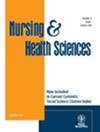确定基于健康信念模式的教育培训计划对 2 型糖尿病患者的健康信念认知和痴呆症预防行为的可行性和初步疗效
IF 2.1
3区 医学
Q2 NURSING
引用次数: 0
摘要
这项准实验研究评估了基于健康信念模型的痴呆症预防教育培训干预项目在改善2型糖尿病患者的健康信念感知和痴呆症预防行为方面的可行性和初步疗效。研究采用简单随机抽样方法,从当地 12 家机构中选择了两家社区医院,共 72 名符合条件的参与者。其中一家医院(22 名患者)被分配到痴呆预防教育培训干预项目中,另一家医院(23 名患者)被分配到对照干预项目中(采用简单随机抽样法)。研究的主要结果是可行性,次要结果是痴呆症预防行为和健康观念的变化。招募率为 62.5%(45/72),各组中均有 22 名患者完成了结果测量并参加了治疗,这表明干预措施和研究设计是可行的。基线时各组之间无明显差异。培训后,干预组参与者在预防行为和健康信念认知方面的得分明显高于对照组。干预组的结果与对照组相比有明显变化。研究结果表明,进行后续的完全有效的实验研究是可行的,而且干预措施具有良好的效果。本文章由计算机程序翻译,如有差异,请以英文原文为准。
Establishing the feasibility and preliminary efficacy of a health belief model based educational training program on health belief perceptions and dementia-preventive behaviors in people with type 2 diabetes
This quasi-experimental study evaluated feasibility and preliminary efficacy of dementia-preventive educational training intervention program based on the health belief model for improving perceived health beliefs and dementia-preventive behaviors among people with type 2 diabetes mellitus. Two community hospitals with 72 eligible participants were chosen from 12 local institutions using simple random sampling method. One hospital (22 patients) was allocated to dementia-preventive educational training intervention, and the other hospital (23 patients) was allocated to control intervention (using simple random sampling). Primary study outcome was feasibility, and secondary outcomes were changes in dementia prevention behaviors and health belief perceptions. Recruitment rate was 62.5% (45/72) and 22 patients in each group totally completed outcome measures and attended sessions, indicating feasibility of the intervention and study design. There were no significant differences between groups at baseline. After training, participants in the intervention group had significantly higher scores than control group in prevention behaviors and perceptions of health beliefs. The intervention group experienced significant with-group changes in outcomes. Results show that conducting a subsequent fully powered experimental study is feasible, and the intervention has promising efficacy.
求助全文
通过发布文献求助,成功后即可免费获取论文全文。
去求助
来源期刊
CiteScore
4.80
自引率
3.70%
发文量
91
审稿时长
6-12 weeks
期刊介绍:
NHS has a multidisciplinary focus and broad scope and a particular focus on the translation of research into clinical practice, inter-disciplinary and multidisciplinary work, primary health care, health promotion, health education, management of communicable and non-communicable diseases, implementation of technological innovations and inclusive multicultural approaches to health services and care.

 求助内容:
求助内容: 应助结果提醒方式:
应助结果提醒方式:


